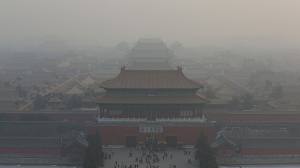Archive
Privatizing Clean Air? Put it in a can!

China’s pollution problem is getting worse, but there is a silver (or at least aluminum) lining to the problem. Eccentric multi-millionaire Chen Guangbiao is selling cans of clean air in a variety of scents such as Pristine Tibet, Post-Industrial Taiwan and Revolutionary Yan’an (though one seems a little more appealing than the others). Pollution levels have reached “off the charts” levels with 99% of urban Chinese breathing air the would be considered unsafe by European standards. Particulate matter is particularly high, exceeding 20 times the World Health Organization’s safe level.
Common resources such as air, water, and communal pastures have long posed a problem for environmental protection. The theory of the Tragedy of the Commons suggests that given a shared resource, it’s in each individual’s interest to deplete the resource as quickly as possible to maximize personal utility over others. The most common proposed solutions to such problems is primarily enclosure and privatization, or secondly regulation. China’s pollution problem falls into the Tragedy of the Commons category. China’s addicted to growth, and fears that regulation may deter growth makes it an daunting (though increasingly necessary) task. Privatizing air is an exceedingly difficult thing to do with such an ephemeral resource. Mr. Guangbiao has not solved the Tragedy of the Commons problem, but he has privatized a substitutable good. The same way hay is grown elsewhere and brought in to substitute for pasture, Mr. Guangbiao has captured air elsewhere and brought it to the market. This does nothing to rectify the degradation of the commons. This interesting approach has been referred to as “yuppie capitalism“, though profits are reportedly going either to the military or to environmental organizations.

Though this effort is too small, unfeasible, and unlikely to make any impact more than a novel news note, it does represent an increasing market for relief from our self-created environment. This is a strange manifestation of environmental degradation.